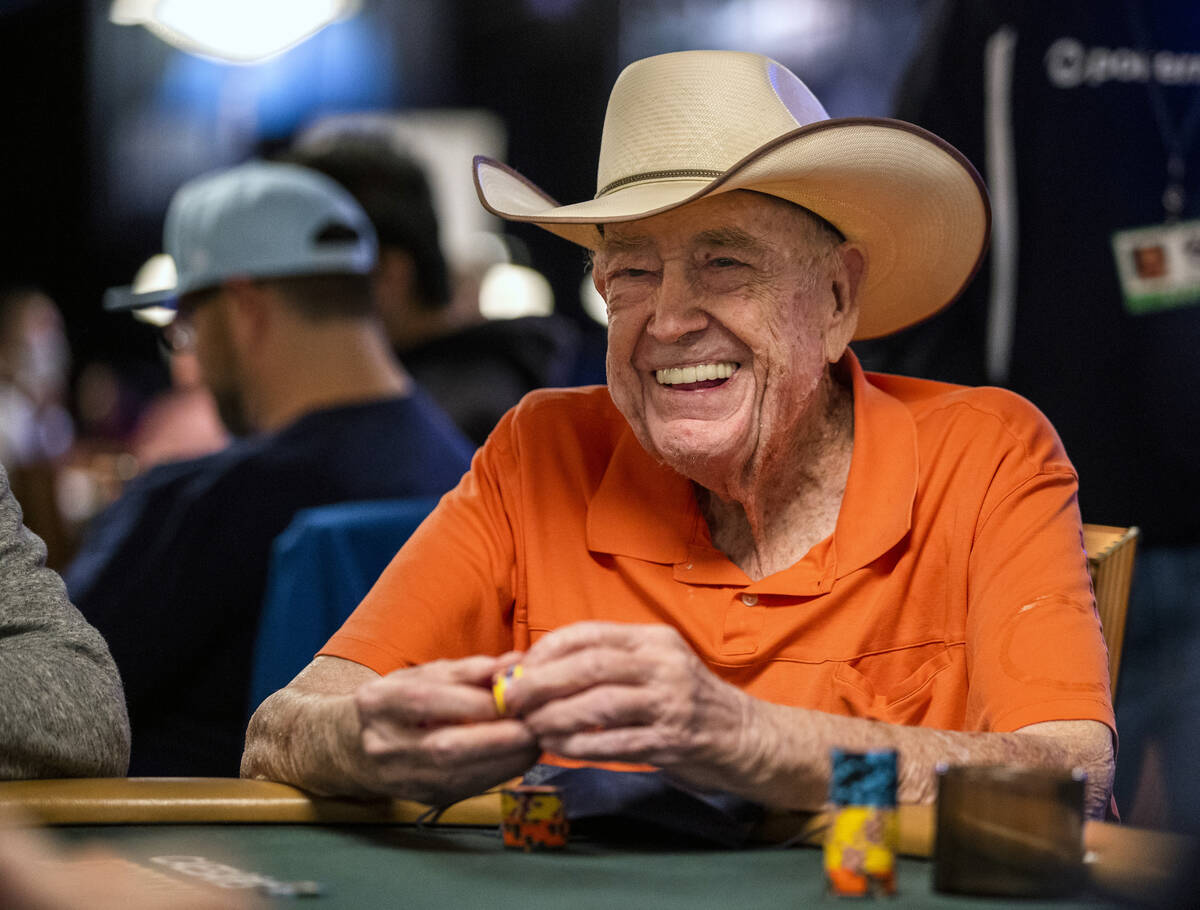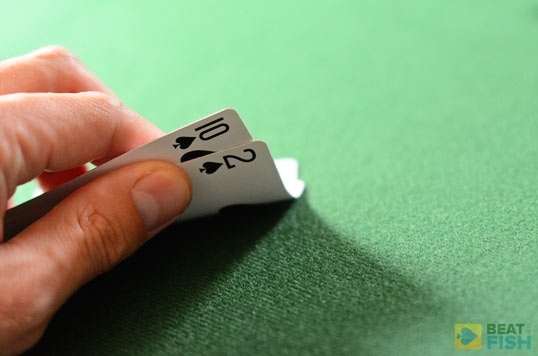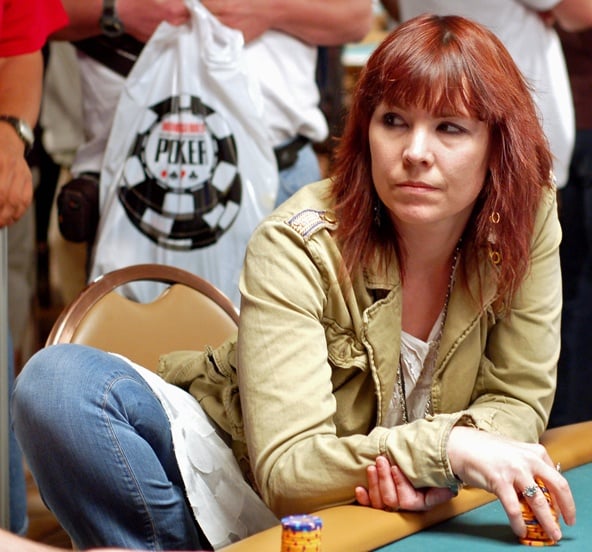Doyle Brunson has been called the “most influential force in the world of poker.” He was the game’s first millionaire and even has a specific poker hand named after him. But that hand—the “Doyle Brunson”—is actually a memorial to his stupid poker decisions.

A “Doyle Brunson” occurs when you’re dealt a 10-2 in Texas Hold ‘Em. Brunson used 10-2 to win the 1976 and 1977 World Series of Poker. Both wins involved outrageous luck.

In 1976, Brunson outlasted all competitors and faced Jesse Alto in the final pairing. On what would be the last hand of the tournament, Brunson was dealt, as we know, 10-2. Even though Brunson didn’t know Alto’s hand, he did know his hand was worse than average. 10-2 is only better than ~40% of possible poker hands.
Alto bet. Brunson called (a negative expected value, a bad bet).
The flop came 10-Jack-Ace. Brunson paired his 10. But if Alto had a Jack or Ace, he’d have the higher pair. Turns out, Alto had both.
So Alto went all-in with two high pairs and Brunson called. They revealed their hands and Brunson saw the bad news: his 10’s were getting crushed by Alto’s two-pair. He faced a 90% chance to lose.
The 4th card (the “turn”) was a 2. It gave Brunson a sliver of hope.
And then the 5th card (the “river”)…was a 10! Full house, 10’s over 2’s, beats two-pair!
The 1977 tournament played out in an eerily similar fashion. Brunson reached the final pair and was dealt a 10-2. He played the hand (again, as a 40/60 underdog) and once again paired his 10 on the flop while his opponent flopped two-pair.
And for the second straight year, Brunson caught a 2 and a 10 on the turn and the river. His lucky full house again winning him the World Series of Poker.
After luck like that, what else could you call a 10-2 hand but a Doyle Brunson.

The Odds Against Doyle
But it was dumb luck.
Doyle Brunson didn’t know his opponents’ cards.
But we know his “blind odds” were 42% in 1976 (his 10-2 were suited) and 39% in 1977 (different suits). He was the underdog from the beginning both years. He had bad hands.
But he won. Which means he made the right bets. ...right?!
Wrong.
To judge a decision by its outcome is called results-oriented thinking. It’s a terrible bias. As poker star and author Annie Duke writes:
There are exactly two things that determine how our lives turn out: the quality of our decisions and luck. Learning to recognize the difference between the two is what thinking in bets is all about.

Results are a function of decisions and luck. It’s easy to measure luck in poker. We know the probabilities. And we know that Doyle Brunson got lucky (at least on those two legendary hands).
You can control your decisions. You can think, calculate, and stay patient. And over many, many, many trials, better decisions will lead to measurably better outcomes.
But you can’t control luck. In poker, in investing, and in life, luck always plays a role.
People make terrible mistakes when they judge one decision based on one outcome. Since there’s only one trial, it’s too hard to determine whether luck, skill, or both were involved.
In Brunson’s case, he won twice despite being a 40/60 underdog. If he played that hand a thousand times, he would win 400 and lose 600. He happened (i.e. got lucky enough) to secure two of those improbable wins on poker’s biggest stage.
Bad Luck in Life and Investing
I was driving to work the other day and the Tesla in front of me almost got wrecked by an idiot driver. Where did the Telsa go wrong? What mistake did they make? None! It was just bad luck.
PS – get a dash cam! It’s a great personal finance decision, as it can save you $1000’s when other people are a$$holes. I bought this one for myself and my fiancee. It’s $50 on Amazon.
You can’t control other drivers. You can’t control disease, the weather, or any number of problems in our world.
But you have a “sphere of influence” that you can control. You can drive defensively, wash your hands, or keep an umbrella in the car. Risk mitigation, in other words, is an active decision that protects you against bad luck.
Doyle Brunson is no dummy. He made many quality decisions to reach the final table at the World Series of Poker. Over many, many trials (a.k.a. hands of poker), his skill elevated him.
But on those two particular hands that made 10-2 famous, he got lucky. We have to separate the result (he won!) from his decision (he played bad hands).

In the 2×2 matrix above, we should strive for deserved success and bad breaks. In both cases, our decisions are good. We optimize the things we control. Luck then smiles (success) or frowns (failure) upon us.
But our monkey brains are too easily fooled, and fooled in both directions.
- When outcomes are good, our egos default to, “I’m a smart monkey.” Everything looks like Deserved Success. Far too few people admit when they benefit from Dumb Luck.
- When outcomes are bad, people tend towards extremes. Our egos fool us into seeing Bad Breaks. I bet you know someone who is never at fault. How could they be?! They’re perfect!
- But other people irrationally frame their bad outcomes as Poetic Justice. They think, “I must have done something wrong to end up here. I’m in control of my life, and this outcome is 100% my fault.”
The truth is that luck and control are both always present, albeit in varying degrees.
2022’s investing environment provides another perfect example.
Kimmy, 23, makes her 2022 New Year’s Resolution, “I’m finally going to open that Roth IRA and invest $6000 into an S&P 500 index fund. I’m really doing it!” That was the beginning of January.

Here we are in June 2022, and Kimmy’s IRA is now worth…$5200. Judging only by that result, what conclusion do we reach?
Investing is stupid! Stocks are dumb! Kimmy lost $800. What an idiot! She should never take that kind of risk again!
But we know better. We know these conclusions ring false. And the reason, as we’ve learned today, is that we need to judge Kimmy on her decision-making, not on her result.
As we’ve covered on The Best Interest, investing via lump sum makes sense. At Kimmy’s young age, a diverse, stock-heavy portfolio makes sense. Over the long run—over many years—it leads to more good outcomes than bad.
Kimmy made a good choice, a good decision. But so far in 2022, the market has plagued Kimmy. And that’s out of her control.
Enough Dumb Luck for One Day
Doyle Brunson’s dumb luck got a hand named after him! Granted, the poker world is sharp enough to know it was dumb luck.
The “Doyle Brunson” is a tongue-in-cheek nod to Brunson’s luck. Good outcome! But the process that got him there? Stupid.
If you can make one improvement in your life from this post, memorize this matrix and try to apply it in your life.
Your job, your grades, your college, your friends, your family…think about them. Are the good outcomes Deserved Success? Are the bad outcomes Bad Breaks?

All we can do is improve our decision-making and fold the bad hands. Luck falls where it may.
Thank you for reading! If you enjoyed this article, join 8000+ subscribers who read my 2-minute weekly email, where I send you links to the smartest financial content I find online every week.
-Jesse
Want to learn more about The Best Interest’s back story? Read here.
Looking for a great personal finance book, podcast, or other recommendation? Check out my favorites.
Was this post worth sharing? Click the buttons below to share!
When I retired I had a last traunch of stock appreciation rights worth $60,000. It was December and it was the biggest tax year of my life, before Trump cut the rates, and I had $430K of income already. I was retiring the next month, January, so that year my income was going to be much lower, without a job. So I made the smart decision to wait until January to cash in the stock rights and save $15,000 in taxes. After all the stock had stayed level or gone up every month for a year. No way it couldn’t hang in there one more month. Well, it crashed, my rights went under water, then expired still under water. I got zero when I could have sold them for $60,000 only a few weeks before. I think it was one of those 90%, no brainer decisions that just didn’t work out right. I think I made the smart move but got unlucky. I lost $60k trying to save $15k. That’s not really significant money to me now, or then. But it still stings when I think about it.
Wow. That’s a crazy story, Steve. But from the outside looking in, I agree with you.
Sounds like a pretty low probability event must have occurred to screw you over like that. Tough to plan for those “black swans.”
-Jesse
Great post on luck and great matrix on process vs outcome. Knowing the difference is a sign of someone who is insightful. Another thing on luck there is a saying “hard work bring good luck” which in my experience seem to be true.
Thanks Tech!